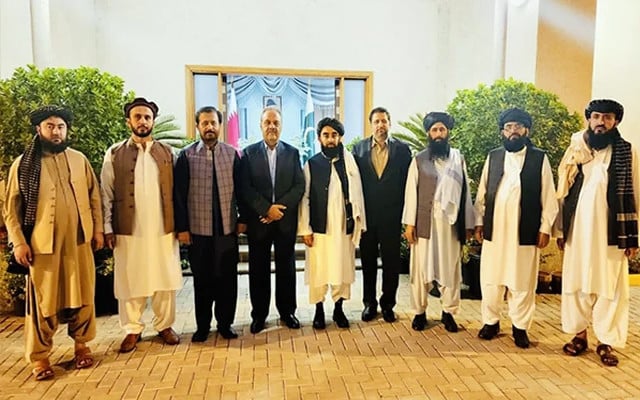
Pakistan and the Afghan Taliban held crucial talks, first in several months, in the Qatari capital as part of the latest push to iron out their differences on the banned Tehreek-e-Taliban Pakistan (TTP).
The talks were held at the residence of Pakistan’s Ambassador to Qatar, between Pakistan’s special envoy on Afghanistan Ambassador Asif Durrani and Chief Taliban spokesperson Zabiullah Mujahid on Monday.
Durrani and Mujahid were leading their countries’ respective delegations at the third meeting of the Doha process on Afghanistan.
On the sidelines, Pakistan’s Ambassador to Qatar invited Zabiullah Mujahid over a dinner where he held formal talks with Ambassador Asif Durrani.
Zabiullah termed his interaction with Pakistan “good” and expressed the hope that relations between the two neighbours would improve. Durrani, meanwhile, said he discussed the Doha meeting and regional issues with the Taliban delegation.
The meeting took place against the backdrop of simmering tensions between Pakistan and the Afghan Taliban government. Tensions deepened further after Pakistan indicated it might resort to cross border strikes to target the terrorist hideouts of TTP.
Sources said the meeting was part of renewed efforts by Pakistan to convince the Afghan Taliban to get rid of the TTP and its affiliates. The latest push came after Pakistan decided to use all possible diplomatic options to resolve the issue of TTP.
One source told The Express Tribune on Tuesday that the Taliban side was conveyed that there was no issue between the two neighbours except the TTP. Durrani told the Taliban spokesperson that if Kabul took care of the issue, the relation between the two countries would see a positive turn.
During the closed-door session of the Doha meeting, Durrani brought up the issue of sanctuaries and urged the Afghan Taliban to tackle them.
Besides holding a bilateral meeting, Pakistan and Afghanistan officials were joined by Qatar and Uzbekistan at the sidelines of the Doha conference to discuss a trans-railway project that would connect Pakistan and Uzbekistan via Afghanistan.
Meanwhile, following the conclusion of the two-day meeting, a senior UN official clarified that the Doha meeting and the presence of the Taliban delegation must not be misconstrued as international recognition of the Kabul regime or step towards it.
“This is not a meeting about recognition. This is not a meeting to lead to recognition ... Having engagement doesn’t mean recognition,” UN Under-Secretary-General for Political and Peacebuilding Affairs Rosemary Dicarlo told reporters in Doha.
“This isn’t about the Taliban. This is about Afghanistan and the people,” she stressed, conceding that the UN had to concede to the Taliban demand since many stakeholders felt their presence in the meeting was important.
However, she made it clear that this did not mean that the issue of girls’ education and human and women rights were no longer a priority of the UN and other stakeholders.


















COMMENTS
Comments are moderated and generally will be posted if they are on-topic and not abusive.
For more information, please see our Comments FAQ